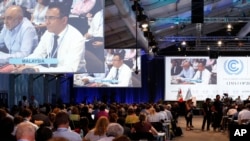After late-night wrangling at a United Nations climate conference in Peru, negotiators early Sunday reached a deal that sets the stage for a global climate pact in Paris next year.
The Lima agreement was adopted hours after earlier drafts were rejected by developing countries who accused rich nations of shirking their responsibilities to fight global warming and pay for its impacts.
The final draft apparently alleviated those concerns with language saying countries have "common but differentiated responsibilities'' to deal with global warming. Countries are to submit national plans on dealing with climate change for consideration ahead of next December's summit in Paris.
Delegates had been wrangling over contents for a final draft since Friday when the conference was scheduled to end.
Peru's environment minister, Manuel Pulgar Vidal, said "Allow me to tell you all that as with all texts, this is not perfect, but it respects the positions of the parties, and aims to be a product of its own, which is one that is based on what has been proposed to the president of COP. And with this text, we all are winners, no exceptions. I have heard from all of the groups and I have the absolute assurance that with the text we are to receive, we are all winners.''
U.S. climate change envoy Todd Stern had warned deadlocked delegates Saturday that failure to reach an immediate compromise on carbon pollution standards could doom chances for a global pact at the Paris summit next December.
Stern urged delegates to accept a compromise text, and warned that failure to do so would damage the overall credibility of U.N. efforts to slow climate change.
The Paris treaty envisioned for next year would replace the Kyoto Protocol -- the global agreement on cutting greenhouse gas emissions that expired in 2012.
Greenhouse gases are blamed for causing global temperatures to rise. Scientists warn that more extreme droughts, floods and rising seas are on the way unless the emissions are reduced.




